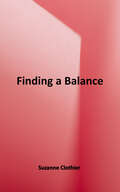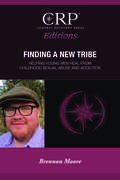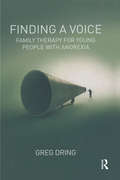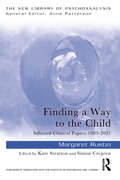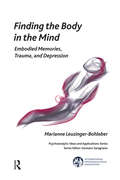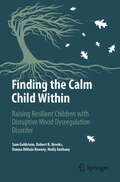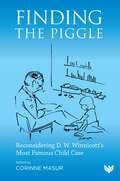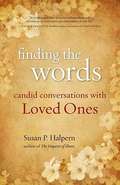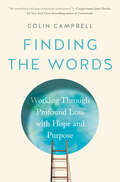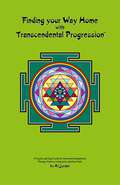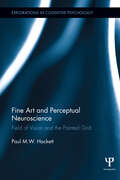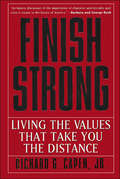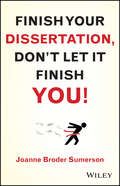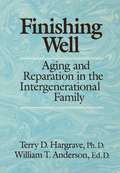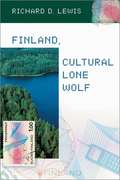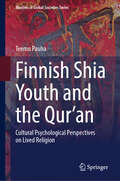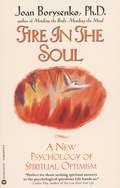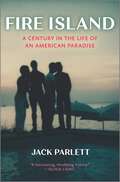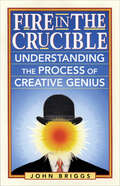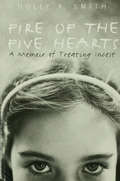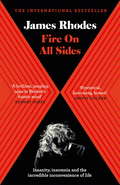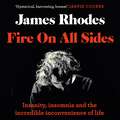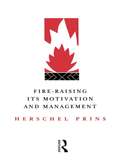- Table View
- List View
Finding a Balance: Issues of Power in the Human/Dog Relationship
by Suzanne ClothierThis is the revised and expanded 2017 edition, examines the differences between canine and human perceptions of power and leadership. What we consider loving and responsible behavior, our dogs may see as ineffective or confusing. Is your dog a Trust Fund Puppy? This booklet offers tips on evaluating the balance of power in your household, as well as easy to use, commonsense guidelines for establishing or restoring a healthy balance to your relationship with your dogs. Includes an abbreviated version of Puppy Politeness Poker plus PPP Worksheets and Cards. The complete PPP information can be found in Attentive Cooperation. If your goal is a friendship, not a dictatorship, this book will help you recognize your dog's cultural needs for leadership and find ways to meet those needs in a holistic and loving way.
Finding a New Tribe: Helping Young Men Heal From Childhood Sexual Abuse and Addiction
by Brennon MooreWhen addiction and trauma related to sexual abuse co-occur in the lives of young men the processes of treatment and recovery are significantly complicated. Many cycle through treatment centers at alarming rates through involuntary discharge or leaving AMA. Brennon Moore's approach combines empathic understanding with experiential and less-verbal methods to meet the needs of these challenging clients and facilitate healing.
Finding a Voice: Family Therapy for Young People with Anorexia
by Greg DringYoung people develop anorexia because they are unhappy. In the process of becoming anorexic they silence themselves and distance themselves from parental support. Family therapy can help patients by improving their communication with their parents. Therapists can support parents in helping their children to find their voices. This book presents a review of the research evidence that has guided the development of family therapy for young people with anorexia. In addition, it presents the current evidence for a family model. A flexible model is proposed to meet different family scenarios and levels of treatment resistance. Greg Dring argues that the evidence indicates the need for an assertive approach to therapy, drawing on the full range of family therapy skills available, in order to re-instate a healthy relationship between parents and children. This book is intended for family therapists and other clinicians in Child and Mental Health Services who work with young people with anorexia.
Finding a Way to the Child: Selected Clinical Papers 1983-2021 (New Library of Psychoanalysis)
by Margaret RustinMargaret Rustin’s writing is characterised not only by its subject matter, which is diverse, but by her imaginative sensitivity to the emotional lives of children and young people, the depth of her understanding, and her original insights into the complexities of child and adolescent psychotherapy. Here a selection of her work, edited by Kate Stratton and Simon Cregeen, is brought together in a collection which focuses mainly on clinical issues and concerns: the dynamics of the interaction between patient and therapist in the consulting room; the task of assessment; the particular needs of children and young people whose early development has been distorted by trauma, loss or neglect; and the framework and skills required for effective psychoanalytic work with parents. Illustrated by vivid narratives detailing the strains and possibilities of the therapeutic encounter, this book is a record of clinical work and thinking over 50 years of psychoanalytic practice. It will prove essential reading for psychoanalysts and child analysts, child psychotherapists, all those training as mental health professionals in work with children and parents, and anyone with an interest in deepening their understanding of the emotional lives of children and young people.
Finding the Body in the Mind: Embodied Memories, Trauma, and Depression (The International Psychoanalytical Association Psychoanalytic Ideas and Applications Series)
by Marianne Leuzinger-BohleberSince the 1990s many different scientific disciplines have intensified their interest in the so called 'mind-body-problem': psychoanalysis, philosophy, academic psychology, cognitive science and modern neuroscience. The conceptualization of how the mind works has changed completely, and this has profound implications for clinical psychoanalytical practice as well as for theorizing in contemporary psychoanalysis. The question of how unconscious fantasies and conflicts, as well as traumatic experiences, can be understood and worked through is, and has been, one of the central topics of psychoanalysis. Interdisciplinary studies from the fields of embodied cognitive science, epigenetics, and cognitive neuroscience offer challenging explanations of the functions in the analysts mind which might allow him to create spontaneous associations through which he unconsciously 'understands' the traumatic, embodied experiences of the patient.
Finding the Calm Child Within: Raising Resilient Children with Disruptive Mood Dysregulation Disorder (Copernicus Books)
by Sam Goldstein Robert B. Brooks Donna DiMaio Rooney Molly AnthonyIn the intricate landscape of childhood emotional and behavioral challenges, disruptive mood dysregulation disorder (DMDD) stands as one of the most daunting. Characterized by intense irritability and explosive outbursts, DMDD can transform the journey of parenting and teaching into a relentless storm, leaving families and educators searching for guidance and support. This book offers a beacon of hope as well as a comprehensive resource crafted for those dedicated to nurturing children with DMDD. Key areas of coverage include: · Biological, psychological, and environmental factors contributing to DMDD and how to recognize and assess its symptoms effectively. · Evidence-based approaches to assessing and treating DMDD, from parent training and therapeutic interventions to medication management. · The eight guideposts for building resilience to help children with DMDD navigate their emotions, develop problem-solving skills, and cultivate self-discipline and empathy. · Real-life inspirational and practical wisdom from the experiences of families who have courageously and lovingly faced the challenges of DMDD. <span style="font-size: 11.0pt;
Finding the Piggle: Reconsidering D. W. Winnicott's Most Famous Child Case
by Corinne Masur2021 Grandiva Award Winner The Piggle is one of the most famous and beloved child cases in the history of psychoanalysis. A two-year-old girl suffering from terrible nightmares, depression, and self-harming behaviours, the Piggle, came to Donald Winnicott for treatment. In writing up the case and allowing it to be published (with the posthumous help of his wife Clare and his student, Ishak Ramsey), Winnicott invited the world into his consulting room and allowed the inner world of the very young child to be seen. Seven psychoanalysts rediscover the Piggle, meeting her as an adult, re-scrutinising the case as it was formulated by Winnicott, and suggesting new understandings of the Piggle's material. Introduced by a foreword from Angela Joyce, the book features an interview with the adult Piggle, discussing her recollections of the treatment and her view of its impact many years on, as well as a meticulous historical overview from an investigation of 'The Piggle' archive revealing previously unknown information, a critical, detailed reappraisal of the case, and reflections from several authors on how modern psychoanalytic technique might be applied to the case were the Piggle to be seen in 2020. In this age, when the voice of the child needs to be heard more than ever, Finding The Piggle gives new life to this classic piece of psychoanalytic literature in which the importance of the child's feelings and conflicts is made abundantly clear. With this comprehensive exploration, a new generation of clinicians and others can rediscover this important case and think about it anew.
Finding the Words: Candid Conversations with Loved Ones
by Susan P. HalpernFinding the Words offers principles and practical suggestions for those moments in relationships when one wants to be kind but also must discuss a sensitive matter. In thoughtful prose, Susan Halpern explains how to communicate with care in order to strengthen and increase our loving connections. The principles provided in the book--speaking from the heart, stating intentions, and deep listening--enable readers to navigate difficult encounters. Halpern draws on her years of experience as a psychotherapist, wife, and mother to suggest possible, scripted solutions and positive outcomes for a wide range of situations: a partner who needs to talk about the irritations of joint living, parents of an adult child who requires unexpected financial support, grandparents who don't know how to intervene, siblings who disagree about politics or religion, and couples in times of crisis, illness, affairs, and divorce. An essential book for finding one's way back to intimacy from conflict, nagging discomfort, and anger, Finding the Words teaches methods of responding, negotiating, and compromising. While there are numerous guides to relationships, no other book presents life situations--along with actual words that can be used to cope with them--with such vitality and wisdom.
Finding the Words: Working Through Profound Loss with Hope and Purpose
by Colin CampbellA powerful account of one father&’s journey through unimaginable grief, offering readers a new vision for how to more actively and fully mourn profound loss. When Colin Campbell&’s two teenage children were killed by a drunk driver, Campbell was thrown headlong into a grief so deep he felt he might lose his mind. He found much of the common wisdom about coping with loss—including the ideas that grieving is a private and mysterious process and that the pain is so great that &“there are no words&”—to be unhelpful. Drawing on what he learned from his own journey, Campbell offers an alternative path for processing pain that is active and vocal and truly honors loved ones lost. Full of practical advice on how to survive in the aftermath of loss, Finding the Words teaches readers how to actively reach out to their community, perform mourning rituals, and find ways to express their grief, so they can live more fully while also holding their loved ones close. Campbell shines a light on a path forward through the darkness of grief.
Finding your Way Home with Transcendental Progression
by A. I. JordanThis book is a practical script for any reader keen to explore Self in greater depth, seeking to heal personal dysfunction, wanting to achieve improvements in the quality of living or wishing to increase insight, understanding and self-development. Additionally it is a guide for anyone questing on a spiritual path.
Fine Art and Perceptual Neuroscience: Field of Vision and the Painted Grid (Explorations in Cognitive Psychology)
by Paul HackettOver the past decade, the integration of psychology and fine art has sparked growing academic interest among researchers of these disciplines. The author, both a psychologist and artist, offers up a unique merger and perspective of these fields. Through the production of fine art, which is directly informed by neuroscientific and optical processes, this volume aims to fill a gap in the literature and understanding of the creation and perception of the grid image created as a work of art. The grid image is employed (for reasons discussed in the text) to illustrate more general processes associated with the integration of vision, visual distortion, and painting. Existing at the intersection of perceptual neuroscience, psychology, fine art and art history, this volume concerns the act of painting and the process of looking. More specifically, the book examines vision and the effects of visual impairment and how these can be interpreted through painting within a theoretical framework of visual neuroscience.
Finish Strong
by Richard G. CapenIn this inspirational book of values, former ambassador Dick Capen presents a refreshing balance of optimism and realism to remind us that it's never too soon, never too late, to "finish strong."
Finish Your Dissertation, Don't Let It Finish You!
by Joanne Broder SumersonAn all-inclusive, practical guide to help you design, conduct, and finish your academic dissertation—with minimal drama Sharing the secrets for successfully navigating through the dissertation and thesis process while maintaining your sanity, Finish Your Dissertation, Don't Let It Finish You! presents comprehensive coverage of the entire dissertation process, from selecting a committee and choosing a research topic to conducting the research and writing and defending your dissertation. Joanne Broder Sumerson follows the sequential flow of a dissertation, to help you move through the process in a logical, step-by-step manner, with an abundance of practical examples and useful tips on: Proper dissertation etiquette—smarts and strategies for managing the committee Breaking ground on your study The anatomy of the five chapters of your dissertation Making a compelling argument for why your study should be done Creating an exemplary literature review The best practices in research design Getting official approval from the Institutional Review Board Organizing your freshly collected data Concluding your dissertation Presenting a smooth oral defense
Finishing Well: Aging And Reparation In The Intergenerational Family
by Terry D. Hargrave William T. AndersonOffers therapists guidance in helping multigenerational families with older members understand and cope with the myriad challenges they face. The text considers such issues as: confronting death; life validation; life review; and exoneration, forgiveness, and healing in the family.
Finland, Cultural Lone Wolf
by Richard D. LewisFinland, Cultural Lone Wolf is the story of an accomplished nation and her extraordinary people. By pursuing a 'Lone Wolf' policy, Finland raised itself from a struggling, war-battered state to one of the most developed countries in the world over the course of only fifty years. The exponential rise of Nokia from tires and timbers to leading the world_s telecommunication industry is indicative of the Finns and their business style. These remarkable people speak a language unique in its origins and have kept their cultural identity intact despite the influences of powerful neighbors, Sweden and Russia. Uniquely qualified to write about Finland, best-selling author Richard Lewis traces the fascinating Finnish origins, as well as her history, geography, values and culture. His extensive experience with Finnish business provides him with keen insight on leadership style, negotiation strategies and the uniquely Finnish suomi-kuva, or Finland image. Lewis shines when describing Finnish humor, complete with laugh-out-loud jokes and stories. Finland, Cultural Lone Wolf shows both nation and writer at their best.
Finnish Shia Youth and the Qur’an: Cultural Psychological Perspectives on Lived Religion (Muslims in Global Societies Series #13)
by Teemu PauhaThis book investigates the role of the Qur’an in the everyday lives of young Shia Muslims in Finland. Adopting a cultural psychological perspective on Islamic scripture, the book approaches the Qur’an as a symbolic resource that young Muslims can draw on to find guidance and support, to reflect on the meaning and purpose in their lives, or to experience community with other believers. The book emphasizes the variety of ways in which young Shia Muslims relate to the scripture, bringing to life the various ways in which young Shia Muslims grapple with a text that is difficult to understand and try to construct a meaning that makes it relevant in the context of contemporary Finland. This book provides a novel approach to the religious lives of a little-known religious minority. In addition, it brings together fields that have so far been largely separate, in particular cultural psychology and Islamic studies. As such, the book provides a valuable resource to scholars interested in lived religion, religious minorities, Islam in Europe, sacred texts, as well as culture and human mind.
Fiona
by Meredith MooreFiona has a chance to leave her dark past behind. Fee receives an email from a stranger named Lily, a countess who claims to have known her now-deceased mother. Lily invites her to live in her Scottish castle as an au pair for her young daughter, Poppy. But the family secrets she brings with her will either destroy her . . . When Fee starts hearing and seeing strange things around the castle at night, Fee is terrified she's inherited her mother's illness. She tells no one. Or set her free. Revealing her true identity might be the only thing that can release Fee from her tragic past. But will anyone believe her? Can Fee even believe herself?From the Hardcover edition.
Fire In The Soul: A New Psychology Of Spiritual Optimism
by Joan Borysenko"Gifted healer Joan Borysenko believes that the wounds we suffer - and heal from - can be gateways to a transformation of the spirit, one that not only nourishes our souls but blesses us with the potential to help our world." "In this enlightening book, Dr. Borysenko goes beyond psychology as currently practiced and taps a deeper vein of healing. She reveals to us the power of spiritual optimism, a philosophy that views life crises as opportunities for personal growth and spiritual homecoming." "Drawing on her own experiences with tragedy and illness, as well as on anecdotes from her therapy patients, the author combines scientific knowledge with wisdom and insight to show how the most devastating events can initiate a fruitful search for meaning; how wrestling with the demons of pain, strife, and illness can lead us to discover our wholeness; and how meditation, prayer, and heightened awareness can serve as shining beacons during the proverbial "dark night of the soul."" "These are the times when the soul is on fire, fueled by torment and despair. Yet this same soul burns with an inner flame that can consume old beliefs and negative opinions, allowing a new soul to be born. Thus our darkest moments can lead to spiritual resurrection, bringing us closer to our true hearts...and to the heart of healing." "Getting there, however, is never easy. "Dark nights of the soul" are perilous emotional voyages through stormy seas of suffering. Here the terrain is shadowy and home seems far, far away; here, most of us need a light to navigate by. "Fire in the Soul" is that light, an inspiring and knowing guide to spiritual safe haven in times of loss and pain. Its insight will help you shed self-blame, heal childhood wounds, and gain strength from adversity so that you can find the goodness that is everywhere and feel the love that lights our universe." "This book also features a practical resource section listing books, tapes, and addresses of helpful individuals and organizations. One of its most comforting chapters contains stories, poems, and quotations to help restore and revitalize spiritual optimism. And that is the first step to leading a life filled with faith, love, and courage."--BOOK JACKET.Title Summary field provided by Blackwell North America, Inc. All Rights Reserved
Fire Island: A Century in the Life of an American Paradise
by Jack Parlett*A Washington Post &“Book to Read This Summer&”**AN ADVOCATE BEST LGBTQ+ BOOK OF 2022*A groundbreaking account of New York's Fire Island, chronicling its influence on art, literature, culture and queer liberation over the past centuryFire Island, a thin strip of beach off the Long Island coast, has long been a vital space in the queer history of America. Both utopian and exclusionary, healing and destructive, the island is a locus of contradictions, all of which coalesce against a stunning ocean backdrop.Now, poet and scholar Jack Parlett tells the story of this iconic destination—its history, its meaning and its cultural significance—told through the lens of the artists and creators who sought refuge on its shores. Together, figures as divergent as Walt Whitman, Oscar Wilde, James Baldwin, Carson McCullers, Frank O'Hara, Patricia Highsmith and Jeremy O. Harris tell the story of a queer space in constant evolution.Transporting, impeccably researched and gorgeously written, Fire Island is the definitive book on an iconic American destination and an essential contribution to queer history.
Fire in the Crucible: Understanding the Process of Creative Genius
by John BriggsThe co-author of Looking Glass Universe probes the nature of creativity and reveals the strategies and tactics of some of our greatest creative minds.What makes geniuses different from the rest of us? What is the difference between a prodigy and a genius? Are geniuses born or made? What is creative vision and where does it come from? What are the secrets of talent? And why do great creators seem to have so many oppositions in their personalities?In this mind-expanding investigation of creativity, John Briggs reveals that there is no special trait of genius. Geniuses are not necessarily smarter or more talented than other people, but they give their attention to subtle nuances, contradictory feelings and perceptions that others experience and ignore. By focusing on sensory nuances, geniuses create themselves.Fire in the Crucible offers a compelling exploration of the roots of creativity and genius. Drawing on the lives and work of extraordinary scientists, artists, writers, composers, and inventors, Briggs shows how creative individuals exploit doubt and uncertainty, and the mental strategies and tactics they employ when they work. “In asking about creativity,” he writes, “we are really asking about what is best, what is deepest in life.” Fire in the Crucible draws the reader into an eye-opening journey through the inner workings of some of the greatest creative minds of all time—and allows us to understand more deeply the nature of creativity in our own lives and work.Praise for Fire in the Crucible“His refreshingly open-ended approach brings us closer to the elusive nature of genius.” —Publishers Weekly“An exuberant voyage through the brains and minds of creative individuals, chock-full of intriguing scientific discoveries and puzzling paradoxes.” —Howard Gardner, Harvard University, author of Multiple Intelligences
Fire in the Dragon and Other Psychoanalytic Essays on Folklore
by Géza RóheimThe only Freudian to have been originally trained in folklore and the first psychoanalytic anthropologist to carry out fieldwork, Gza Rcheim (1891-1953) contributed substantially to the worldwide study of cultures. Combining a global perspective with encyclopedic knowledge of ethnographic sources, this Hungarian analyst demonstrates the validity of Freudian theory in both Western and non-Western settings. These seventeen essays, written between 1922 and 1953, are among Rcheim's most significant published writings and are collected here for the first time to introduce a new generation of readers to his unique interpretations of myths, folktales, and legends. From Australian aboriginal mythology to Native American trickster tales, from the Grimm folktale canon to Hungarian folk belief, Rcheim explores a wide range of issues, such as the relationship of dreams to folklore and the primacy of infantile conditioning in the formation of adult fantasy. An introduction by folklorist Alan Dundes describes Rcheim's career, and each essay is prefaced by a brief consideration of its intellectual and bibliographical context.
Fire of the Five Hearts: A Memoir of Treating Incest
by Holly A. SmithThis book is about the influence of twenty years of work in the field of incest on a therapist's professional and personal life. It is comprised of individual cases, and touches upon topics including spirituality, sex between siblings, counter-transference, and incest teams. The author shares, in unadulterated prose, her experience as an incest therapist. This important, courageous work touches upon issues important to and resonant for mental health professionals treating incest and sexual abuse as well as the incest survivor or survivor's family member.
Fire on All Sides: Insanity, insomnia and the incredible inconvenience of life
by James RhodesThe international bestseller 'Hysterical, harrowing, honest... I really loved this book' Jarvis Cocker 'A brilliant, jangling opus to Rhodes's frantic mind... I cannot write anything more affecting about Rhodes than he can write himself.' Katie Glass, Sunday Times 'Brave and unflinching... Excellent reading... [Rhodes] deserves an ovation for this courageous work.' Helen Davies, Sunday Times'What [Rhodes] describes in Fire On All Sides, writing with the same passion and energy he has when talking, are less destructive, more life-enhancing avenues to cope with anxiety, depression and trauma that he has found effective... An earlier generation might have referred to Rhodes as a tortured genius and left it at that, but his life defies such casual, catch-all labels.' Daily Telegraph 'Rhodes writes like he plays - with power and intensity... Deeply stirring' Evening StandardFor many of us who suffer from depression or anxiety, the simple act of endurance, of having to appear normal, is a daunting, painful and heroic task. Getting out of bed, packing the kids off to school, showing up for work, preparing dinner... These can be astonishing achievements when it sometimes takes a superhuman effort simply to stand upright. How do you keep going? How do you do what you do, day in, day out, conforming to people's idea of you and functioning in the way society expects you to, when all you want to do is disappear and hide? In Fire On All Sides, Rhodes attempts to find how to make the unbearable bearable in the most exposing circumstances imaginable. As he embarks on a gruelling five-month concert tour, performing in front of thousands of people, the tortuous voices in his mind his constant companions, he has no choice but to face these wild, mad ramblings head on. Luckily, there is the music. There is always the music. Bach, Chopin, Beethoven - they are his holy grail, his mechanism for survival. Just. This is an important, urgent book. It's about going through your day feeling like you can't find a way out of the crazy, it's about not setting the happiness bar too high, it's about accepting the messy imperfection that is life. Rhodes explodes the myths surrounding depression, anxiety and stress - the plagues of our society - into a million pieces, then sticks them back together again with his characteristic thought-provoking, laser sharp and humorous style. The really good news? It's going to be OK. Just.
Fire on All Sides: Insanity, insomnia and the incredible inconvenience of life
by James Rhodes'HYSTERICAL, HARROWING, HONEST... I REALLY LOVED THIS BOOK' JARVIS COCKERFor many of us who suffer from depression or anxiety, the simple act of endurance, of having to appear 'normal', is a daunting, painful and heroic task. Getting out of bed, packing the kids off to school, showing up for work, preparing dinner... These can be astonishing achievements when it sometimes takes a superhuman effort simply to stand upright. How do you keep going? How do you do what you do, day in, day out, conforming to people's idea of you and functioning in the way society expects you to, when all you want to do is disappear and hide?In Fire On All Sides, Rhodes attempts to find how to make the unbearable bearable in the most exposing circumstances imaginable. As he embarks on a gruelling five-month concert tour, performing in front of thousands of people, the tortuous voices in his mind his constant companions, he has no choice but to face these wild, mad ramblings head on. Luckily, there is the music. There is always the music. Bach, Chopin, Beethoven - they are his holy grail, his mechanism for survival. Just.This is an important, urgent book. It's about going through your day feeling like you can't find a way out of the crazy, it's about not setting the happiness bar too high, it's about accepting the messy imperfection that is life.Rhodes explodes the myths surrounding depression, anxiety and stress - the plagues of our society - into a million pieces, then sticks them back together again with his characteristic thought-provoking, laser sharp and humorous style. The really good news? It's going to be OK. Just.(P)2018 Quercus Editions Limited
Fire-Raising: Its Motivation And Management
by Herschel Prins Prof Herschel PrinsIn recent years, fire-raising has become an increasing problem in Britain and elsewhere, and now involves many professionals in the investigation and management of those who set fires. The motives of fire-raisers are complex and their behaviour is hard to change. Herschel Prins sets the problem in an historical and anthropological context, examines the size of the problem, its investigation and motivation, in a way which will enable more effective management.
